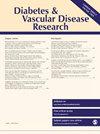COVID-19治疗对高血糖的影响
IF 3
4区 医学
Q3 ENDOCRINOLOGY & METABOLISM
引用次数: 5
摘要
本研究的目的是分析COVID-19药物和生物制剂对高血糖的影响。截止到2021年9月,在PubMed上以“COVID-19药物和高血糖”、“COVID-19疫苗和高血糖”等关键词进行了文献检索。参考疾病预防控制中心的数据进行当前COVID-19概况和统计。更新的治疗建议参考了美国国立卫生研究院COVID-19指南。使用Micromedex和UpToDate获取药物和疾病信息。目前的结果表明,皮质类固醇(地塞米松)、瑞德西韦和抗病毒药物(洛匹那韦和利托那韦)都有可能显著提高血糖水平,使患者面临严重并发症的风险增加。相反,羟氯喹与低血糖有关,而托珠单抗可以减少炎症,从而改善血糖水平。其他抗细胞因子生物活性分子与糖尿病患者和非糖尿病患者的低血糖相关。用于治疗COVID-19轻度疾病的伊维菌素具有降低血糖的潜力。Covishield, Pfizer-BioNTech和Moderna在首次服用后都与高血糖有关。糖尿病合并COVID-19感染患者需要个性化/个性化患者护理。不适当的药物治疗加重了高血糖状况和其他合并症,导致发病率和死亡率增加。本文章由计算机程序翻译,如有差异,请以英文原文为准。
Impact of COVID-19 therapy on hyperglycemia
The goal of this study was to analyze the effect of COVID-19 drugs and biologicals on hyperglycemia. A literature search with key terms, such as “COVID-19 drugs and hyperglycemia” and “COVID-19 vaccines and hyperglycemia,” was conducted using PubMed through September 2021. The CDC data were referenced for current COVID-19 profile and statistics. The NIH COVID-19 guidelines were referenced for updated treatment recommendations. Micromedex and UpToDate were used for drug and disease information. Current results suggested that corticosteroids (dexamethasone), remdesivir and antivirals (lopinavir and ritonavir) all have the potential to significantly raise blood glucose levels putting patients at elevated risk for severe complications. In contrary, hydroxychloroquine is associated with hypoglycemia, and tocilizumab decreases inflammation which is associated with improving glucose levels. Other anti-cytokine bioactive molecules are correlated with lower blood glucose in patients with and without diabetes mellitus. Ivermectin, used for mild COVID-19 disease, possesses the potential for lowering blood glucose. Covishield, Pfizer-BioNTech, and Moderna have all been associated with hyperglycemia after the first dose. Individualized /personalized patient care is required for diabetic mellitus patients with COVID-19 infection. Improper drug therapy aggravates hyperglycemic conditions and other comorbid conditions, leading to increased morbidity and mortality.
求助全文
通过发布文献求助,成功后即可免费获取论文全文。
去求助
来源期刊

Diabetes & Vascular Disease Research
ENDOCRINOLOGY & METABOLISM-PERIPHERAL VASCULAR DISEASE
CiteScore
4.40
自引率
0.00%
发文量
33
审稿时长
>12 weeks
期刊介绍:
Diabetes & Vascular Disease Research is the first international peer-reviewed journal to unite diabetes and vascular disease in a single title. The journal publishes original papers, research letters and reviews. This journal is a member of the Committee on Publication Ethics (COPE)
 求助内容:
求助内容: 应助结果提醒方式:
应助结果提醒方式:


